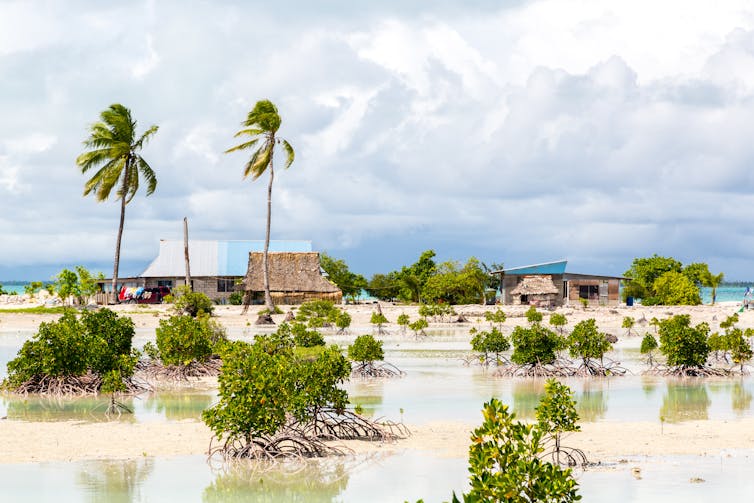Source: The Conversation (Au and NZ) – By Harry Hobbs, Senior lecturer, University of Technology Sydney

Late last year, El Salvador’s president Nayib Bukele announced plans to build “Bitcoin City” – a tax-free territory in the country’s east.
The city will use the cryptocurrency and be powered by the nearby Conchuagua volcano. According to Bukele, there will be:
Residential areas, commercial areas, services, museums, entertainment, bars, restaurants, airport, port, rail [..] [but] no income tax, zero property tax, no contract tax, zero city tax and zero CO2 emissions.
Whether or not Bitcoin City eventuates, it joins a long and bizarre history of libertarian-inspired attempts to start independent cities and countries.
Bitcoin City

Wikipedia
The generous financial incentives in Bitcoin City are aimed at encouraging foreign investment.
However, the plan has quickly been derided by finance commentators as something “worthy of a Bond villain”. There are doubts construction will ever begin.
As the Australian Financial Review observes, Bitcoin City is likely nothing more than a “splashy distraction from Bukele’s economic woes”.
New libertarian cities
But Bukele is not the only one to be tempted to set up a new territory, with new (or no) rules.
In a 2009 TED Talk, American economist Paul Romer argued developing nations should partner with foreign countries or corporations to create autonomous model cities.
Under his plan, host states would lease large tracts of undeveloped land to developed states, who would administer the territory according to their own legal system. The city’s residents would largely come from the developing state, but the administrators of the city would be appointed by (and accountable to) the developed state. Residents could “vote with their feet” by either migrating to or from the model city.
Romer argues such cities would attract significant international investment because their legal architecture would insulate them from any political turmoil present in their host state. Notwithstanding the strong neo-colonial or neo-imperial overtones, several states have considered adopting Romer’s proposition.
The Honduran experiment
In 2011, the Honduran Congress amended its constitution to facilitate the development of Romer’s idea. Cities built within “special development regions” would not be subject to Honduran law or taxation. Instead, they would be self-governing under a unique legal framework.

Salvador Melendez/AP/AAP
After legal disputes about whether this breached Honduran national sovereignty, the plan was revived in 2015. Under the new plan, an investor that builds infrastructure in a site designated as a “zone for employment and economic development” (ZEDE) will be granted quasi-sovereign authority. The investor will be permitted to impose and collect income and property taxes, and establish its own education, health, civil service, and social security systems.
Under the ZEDE law, the president appoints a committee to oversee all of the model cities as well as setting the baseline rules and standards investors must follow. Reflecting the ideological backing of the idea, the first committee, announced in 2014, was heavily comprised of libertarians and former advisers to United States President Ronald Reagan. In 2020, the first site was launched, but development does not appear to have commenced.
To the sea
The Honduran plan involves a country leasing (temporarily or perhaps permanently) sovereign rights over its territory. Other projects have sought to build a new country on the sea.
Since 2008, attention has focused on the California-based Sea Steading Institute.
Founded by American libertarian Patri Friedman (grandson of Nobel Prize-winning economist Milton Friedman) and initially financed by billionaire Peter Thiel, the institute sought to build habitable structures on the high seas – outside the jurisdiction (and taxation) of any state.
Read more:
Why is Australia ‘micronation central’? And do you still have to pay tax if you secede?
Although their website suggests sea steading could offer significant benefits to humanity globally, making money free of regulatory burden is the primary motivation. Backers are interested in sea steading’s potential to “peacefully test new ideas for governance” so “the most successful can then inspire change in governments around the world”.
No city has yet been built. In 2017 negotiations with French Polynesia for the development of floating cities within their territorial waters stalled when community pressure forced the government to withdraw. Many wondered whether “facilitating the tax evasion of the world’s greatest fortunes” would actually be beneficial for the islands.
The Republic of Minerva
Other proposals have not bothered to ask anyone whether they can get started. In the 1960s, several American businessmen sought to establish independent states upon coral reefs off the coasts of California and Florida. Both fell apart under pressure from the US government.
In the early 1970s, US libertarian Michael Oliver tried to finance the construction of a new country – the Republic of Minerva – on a submerged atoll in the Pacific Ocean between Tonga and Fiji. There would be no tax and no social welfare in his laissez-faire paradise.

www.shutterstock.com
Over the second half of 1971, Oliver’s team ferried sand on barges from Fiji to raise the atoll above sea level and commenced basic construction. Oliver envisioned creating 2,500 acres of habitable land elevated around two and a half to three metres above high tide. Floating cities and an ocean resort would also be built.
Progress proved hard going. Only 15 acres of land had been reclaimed by the time Oliver’s funds were exhausted. Nearby countries were also watching with alarm. In June 1972, King Tupou IV declared Tongan sovereignty over the atoll and ejected Oliver’s team.
Oliver abandoned Minerva, but in 1982, another group of American libertarians attempted to reassert and restore the republic. After spending three weeks moored in the lagoon, they were expelled by the Tongan military. Today, Minerva has been “more or less reclaimed by the sea”.
Perhaps they should have invested in Bitcoin.
![]()
Harry Hobbs does not work for, consult, own shares in or receive funding from any company or organisation that would benefit from this article, and has disclosed no relevant affiliations beyond their academic appointment.
– ref. ‘Worthy of a Bond villain’: the bizarre history of libertarian attempts to create independent cities – https://theconversation.com/worthy-of-a-bond-villain-the-bizarre-history-of-libertarian-attempts-to-create-independent-cities-173903




